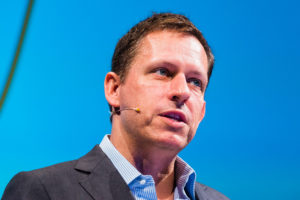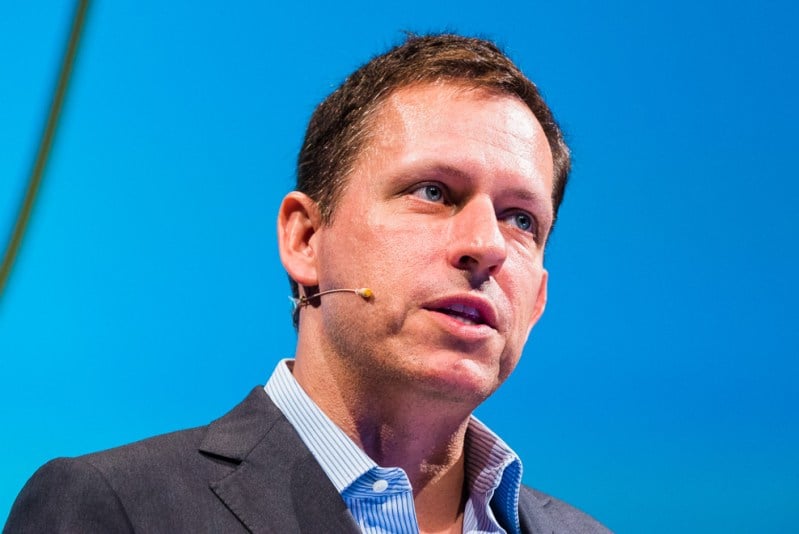Palantir founder Peter Thiel and LinkedIn co-founder Reid Hoffman will kick off the new Cardinal Conversations speaker series on Jan. 31 with a discussion on “Technology and Politics” hosted in Hauck Auditorium.

Thiel and Hoffman’s talk is the first of four Cardinal Conversations aimed at representing a diversity of views and putting the opinions of two people in counterpoint while tackling topics ranging from inequality and populism to sexuality and politics. The series, an initiative of the University president, will be co-hosted by the Hoover Institution and the Freeman Spogli Institute over the rest of the academic year.
Other speakers in the series include author Charles Murray, who co-wrote “The Bell Curve,” former Nightline and ABC broadcast journalist Ted Koppel M.A. ’62, as well as American Enterprise Institute scholar Christina Sommers.
The series is co-led by Michael McFaul, director of the Freeman Spogli Institute, and Niall Ferguson, a senior fellow at the Hoover Institution. Ferguson, who will moderate the discussion between Thiel and Hoffman, said he hopes the event will both educate and excite students about an issue that cannot be reduced to binaries.
“There was a sense that when Stanford was inviting politicians – whether Cory Booker or, for that matter, Hillary Clinton or Susan Rice – there was a certain unexciting quality about their experience,” Ferguson said. “What we wanted were public intellectuals, people with outspoken views and different views.”
The roster includes speakers who have caused controversy nationally and at other universities. Murray, who has been criticized by the Southern Poverty Law Center for “using racist pseudoscience and misleading statistics,” saw his March talk at Middlebury College descend into violence as a student protest turned into physical confrontation. Professor Allison Stanger was injured while escorting him from the scene.
However, compared to the Robert Spencer talk hosted by the Stanford College Republicans earlier this school year, Ferguson said he does not anticipate similar opposition to the Jan. 31 event. Ferguson argued Cardinal Conversations has more bipartisan appeal in contrast with what he described as the more polarizing nature of the Spencer event: Thiel is an open supporter of President Donald Trump, while Hoffman opposes the administration.
“There’s obviously a concern given what events have happened on other campuses,” Ferguson said. “I think [Provost] Persis [Drell] and [President] Marc [Tessier-Lavigne] made it clear in [Notes from the Quad] that there’s a kind of clear line between protest and disruption. We’re happy if people want to express a protest, but clearly, disruptions are not the matter, and we don’t want to see that.”
University spokesperson E.J. Miranda told The Daily in an email that the University expects that “such events will occur in an atmosphere of mutual respect and any protests would be conducted in a peaceful and lawful manner.” He called Cardinal Conversations “student-driven.”
A committee of undergraduates including members of campus groups such as the ASSU, The Stanford Sphere, The Daily and The Stanford Review was formed to discuss the series. The group “kicked around ideas,” Ferguson said, and began recruiting speakers for the Cardinal Conversations series just before Tessier-Lavigne and Drell released their Nov. 7 Notes from the Quad blog post on “Advancing Free Speech and Inclusion.”
Ferguson said a group of undergraduates brought the series idea to his attention last year and that he then discussed it with Tessier-Lavigne and Drell. According to Vice President for University Communications Lisa Lapin, however, the initiative came from the president and provost and “conversations they had with both deans and with students.”
“The provost and president were contemplating and discussing this for some time, and they asked Niall and Mike McFaul to co-lead,” Lapin wrote in an email.
“It is imperative that as a university, we avoid a culture in which people feel pressured to conform to particular views,” the University leaders stated. “One way to encourage that is to ensure that diverse perspectives are actively discussed at Stanford.”
The Stanford Sphere’s editor-in-chief Ravi Harinder Veriah Jacques ’20, who holds a spot on the speaker series’ committee of undergraduates, explained that the speaker series differs from past programming in that it is intended to facilitate productive discussion between individuals from both ends of the political spectrum.
“[The organizers] are very much balancing a left-wing and right-wing speaker and framing it as a discussion between the two, a conversation, whereas past initiatives have very much been ‘invite a crazy right-wing person who’s gonna irritate everyone,’” Jacques said.
Speaking to Stanford News, ASSU President Justice Tention-Palmer said Stanford lacks a “clear forum for discussion” for the ideas brought to campus by speakers.
“Cardinal Conversations is a student-lead initiative to bring this discussion directly to the stage,” he said.
Ferguson added that he sees the Hoover Institution as a unique part of Stanford’s community that exposes students to a greater diversity of viewpoints at a university dominated by left-leaning rhetoric.
“This wouldn’t be happening if it was a homogeneously progressive student body,” Ferguson said. “The idea came from students who felt it would be nice to hear some different voices. Whether they are a tiny minority or a silent majority, I don’t know.”
However, Ferguson explained that the intent behind Cardinal Conversations is not simply to bring more conservative viewpoints to campus. He added that progressive academics simply tend to be booked more often than both classical liberal and conservative speakers, and he hopes more progressive speakers will join classical liberals and conservatives on the west coast in the future.
“Let me be very explicit,” Ferguson said. “This is not some conservative series. It’s aimed at providing intellectual diversity, and if we can look back in a couple of years time and say we managed to get a group from Ta-Nehisi Coates to Charles Murray to come and speak, I would be very pleased.”
McFaul told Stanford News about plans to create similar programming next school year.
“Working with students focused on global issues, I look forward to helping to assemble an equally compelling set of conversations on international and foreign policy issues in the fall,” he said.
In the end, both Ferguson and Jacques agreed that they were excited for the sheer fun of Cardinal Conversations.
“I don’t want loads of liberal students to fear and to think, ‘Oh god, another [right-wing] lunatic,’” Jacques said. “It’s just not that.”
Ferguson echoed Jacques, adding that his experience as an Oxford student informed his desire to promote Cardinal Conversations at Stanford.
“Some of [the] Oxford Union debates were highlights of my undergraduate career because one saw people with international reputation come and discuss the issues of the day,” Ferguson said. “The student audience got to ask them questions and interact with them. It was exciting stuff. I guess I just have a basic gut feeling that there’s not enough of that at Stanford, and we can do something about that and enrich the experience of undergraduate life.”
Contact Holden Foreman at hs4man21 ‘at’ stanford.edu.
Planned Cardinal Conversations for Spring 2018
Jan. 31 – Reid Hoffman and Peter Thiel on “Technology and Politics”
Feb. 22 – Francis Fukuyama and Charles Murray on “Inequality and Populism”
April 9 – Anne Applebaum and Ted Koppel on “Real and Fake News”
May 23 – Christina Sommers and Andrew Sullivan on “Sexuality and Politics”
This post has been updated with comments from E.J. Miranda and Lisa Lapin as well as quotes from a Wednesday Stanford News article. Other updates clarify the aim of the series and note The Daily’s involvement in student discussions.
The article has also been corrected to make clear that the series is an initiative of the University president co-led by McFaul and Ferguson rather than an initiative of Ferguson’s. An earlier version of the article also referred to The Stanford Sphere as Stanford Sphere. The Daily regrets these errors.
